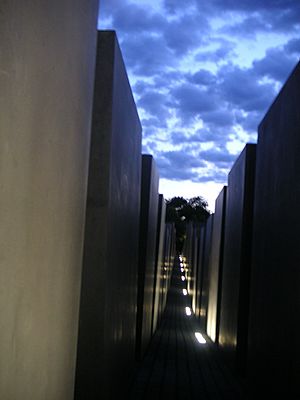Historikerstreit facts for kids
The Historikerstreit (pronounced "His-tor-ee-ker-shtrite") was a big argument among historians and thinkers in West Germany. It was about how the Holocaust should be understood and taught in history. This dispute happened between 1986 and 1989. It involved historians with different political views, often described as "left-wing" versus "right-wing." The argument briefly started up again in 2000. This happened when one of the main people involved, Ernst Nolte, received a literary award. His ideas, like "The past that will not pass away," were seen as not having enough strong evidence.
Contents
What Was the Historians' Dispute?
The Historians' Dispute was a major debate in West Germany. It focused on how to remember and explain the terrible events of the Holocaust. This argument wasn't just among historians. It also involved politicians and the public. People wanted to know how Germany should deal with its past.
Why Did the Dispute Start?
The argument began because of different ideas about German history. Specifically, it was about how the Holocaust should be viewed. Some historians believed it was a unique event. Others tried to compare it to other terrible events in history. This led to a big disagreement.
Ernst Nolte's Ideas
One of the main figures in the dispute was Ernst Nolte. He was a historian who wrote a controversial article. Nolte suggested that the Holocaust might have been a "copy" of the Soviet Gulag camps. The Gulags were forced labor camps in the Soviet Union. Nolte's idea was that the Nazis might have copied these camps. He thought they were reacting to the fear of Soviet communism.
Different Views on History
Many historians strongly disagreed with Nolte's ideas. They argued that the Holocaust was a unique crime. They said it should not be compared to other events in a way that might lessen its horror. Historians like Heinrich August Winkler criticized Nolte. Winkler said that Nolte treated Adolf Hitler and the Nazis too sympathetically. This meant Nolte seemed to understand or excuse their actions too much.
What Happened During the Dispute?
The Historikerstreit was a very public debate. Articles were published in major newspapers. Historians wrote books and gave speeches. They argued fiercely about the meaning of the past. The debate was about Germany's national identity. It also explored how Germans should remember the Nazi era.
Why Was This Dispute Important?
The Historikerstreit was important for several reasons. It showed how difficult it was for Germany to come to terms with its past. It also highlighted the different ways people understood history. The dispute helped shape how the Holocaust is taught and remembered today. It reminded everyone that history is often debated and re-examined.
Images for kids
-
Adolf Hitler. The German historian Heinrich August Winkler wrote: "No German historian has ever accorded Hitler such a sympathetic treatment” as did Nolte.
See also
 In Spanish: Historikerstreit para niños
In Spanish: Historikerstreit para niños




